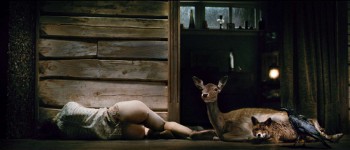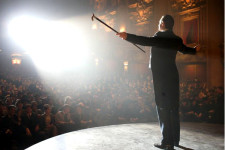Antichrist: A Review in Four Tweets
 Lars von Trier’s Antichrist in 560 characters over four Tweets: descriptive, positive, a turning point, and ultimately (in both the “finally” and “fundamentally” senses of the word) negative.
Lars von Trier’s Antichrist in 560 characters over four Tweets: descriptive, positive, a turning point, and ultimately (in both the “finally” and “fundamentally” senses of the word) negative.
 Lars von Trier’s Antichrist in 560 characters over four Tweets: descriptive, positive, a turning point, and ultimately (in both the “finally” and “fundamentally” senses of the word) negative.
Lars von Trier’s Antichrist in 560 characters over four Tweets: descriptive, positive, a turning point, and ultimately (in both the “finally” and “fundamentally” senses of the word) negative.
 Christopher Nolan directed five movies released this decade; two of them are nearly perfect, one of them has unparalleled rigor for a superhero movie, and the other one has Heath Ledger’s Joker casting an enormous shadow over (and therefore obscuring) its many flaws. The unnecessary remake of Insomnia was the necessary bridge between Memento and Batman Begins – from independent to studio work – but beyond it Nolan has made nothing but winners. To be clear, I don’t believe Nolan is a great filmmaker, and I’m skeptical he’ll ever equal any of these four movies, even though he hasn’t yet turned 40.
Christopher Nolan directed five movies released this decade; two of them are nearly perfect, one of them has unparalleled rigor for a superhero movie, and the other one has Heath Ledger’s Joker casting an enormous shadow over (and therefore obscuring) its many flaws. The unnecessary remake of Insomnia was the necessary bridge between Memento and Batman Begins – from independent to studio work – but beyond it Nolan has made nothing but winners. To be clear, I don’t believe Nolan is a great filmmaker, and I’m skeptical he’ll ever equal any of these four movies, even though he hasn’t yet turned 40.
The easy, conventional reading of Lars von Trier’s Dogville casts it as an anti-American screed. Yet that interpretation exists almost completely outside of the movie itself. In other words, many of von Trier’s critics are full of shit.
The ever-divisive Lars von Trier is not known as a storyteller, and that’s the main reason his miniseries The Kingdom – which was released on DVD in November – is so surprising.
The premise of The Five Obstructions is simple, elegant, and gloriously artificial. A pupil gives his teacher under-any-circumstances-difficult assignments with absurd conditions, and the mentor complies – with no agreed-upon goal beyond the completion of the tasks. Through the assignments, the movie emerges as a portrait of a submissive relationship that’s not at all one-sided.
Just as Pulp Fiction spawned a number of crude imitations, it appears that Lars von Trier’s Breaking the Waves has inspired young filmmakers to mimic his bleak depictions of degradation. The British film Under the Skin brings with it the affectations of von Trier’s film – the hand-held cameras, the grim natural light, the misogyny, the attempted shocks – in the service of a painfully immature story without a shred of psychological understanding or depth in its main character.